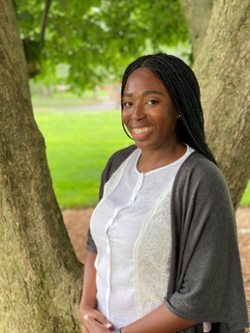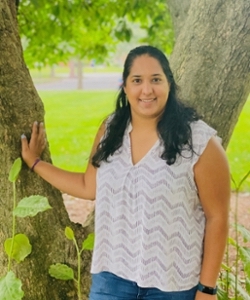Counseling and Psychological Services (CAPS) has welcomed two new clinicians to their staff for the fall 2021 semester: Alison Burge, LPC and Chandni Kapadia, Psy.D.
CAPS Director Jennifer D’Andrea noted Burge’s background and interests as she joins the CAPS team.

“Alison Burge, LPC joined our staff as a full-time psychotherapist in August,” D’Andrea wrote in an email to The Argus. “Alison has worked in a variety of clinical settings and she has a special interest in working with first generation students and students who are struggling with depression and anxiety.”
Burge said that one of the reasons she was interested in working at the University was because, despite her wide range of experience, she had never worked on a college campus.
“I enjoy working with emerging adults, and providing students with a space to process, reflect and work on becoming the best version of themselves,” Burge wrote in an email to The Argus. “I made the decision to work at Wesleyan specifically after conducting my own research and reading about how Wesleyan challenges their students to explore new ideas and make changes in the world.”
Burge noted that college students are a particularly unique client base because they face the challenges of navigating a rigorous academic environment while also learning about their identities and transitioning to adulthood. Burge recognizes that COVID-19 has only added to these challenges, and hopes to factor an awareness of these difficulties into her clinical practice.
“COVID-19 has disrupted the academic experience for many students, leading to an increase in anxious and depressive symptoms,” Burge wrote. “I utilize a client-centered therapy approach which allows for students to be an equal partner within the session.”
Burge is also looking forward to collaborating with existing CAPS programming, such as the BIPOC Mental Health Collective.
“I hope to utilize the BIPOC Mental Health Collective to further connect with students and provide students of color with a safe place to voice their concerns and feel validated,” Burge wrote.
D’Andrea noted that, like Burge, Kapadia looks forward to working with particular student populations.

“Dr. Chandni Kapadia, PsyD joins CAPS this year as our postdoctoral fellow,” D’Andrea wrote. “Dr. Kapadia has a special interest in working with international students and students who have experienced trauma.”
As someone who was an international student when she was in college, Kapadia explained that she brings firsthand experience with helping students adjust to a new culture and move between different environments. Additionally, an interest in helping others heal from trauma has guided the majority of her work in the field thus far.
“I have seen how it can really affect the way someone looks at themselves, the world, and others and how often after a traumatic experience, an individual can really struggle to engage with life as they had before,” Kapadia wrote in an email to The Argus. “I really enjoy working with someone to work through a trauma rather than avoid it or try to ignore it. I think most of all I love to work with how trauma can affect relationships and helping people to form healthy relationships after trauma and recognize their worth in their relationships.”
Kapadia also has a range of professional clinical experience outside of campus settings.
“I have worked in community mental health, university counseling centers, an inpatient hospital setting, and most recently in a VA hospital specializing in PTSD,” Kapadia wrote.
Additionally, Kapadia brings direct experience working with the University’s student population: as part of her training, she worked at Wesleyan in 2018 as a clinical psychology extern.
Looking forward, Kapadia is passionate about bringing high-quality mental health care to the University population, especially for students who may not have experienced working with a mental health clinician.
“Often times, at university is where a lot of people will have their first contact with a psychologist or therapist,” Kapadia wrote. “I think being able to help someone create a healthy relationship with mental health is something I feel passionate about. I would like to help students engage in healthy ways of seeking help and learning more about themselves. I also love to work with college students as most students will begin to understand themselves better as they move away from their home environments. It is often challenging yet rich years for identity formation, and I enjoy helping students understand themselves more.”
Kapadia hopes that students will not hesitate to reach out to the CAPS office if they are in need.
“I would like students to know that no problem is too small to reach out to CAPS,” Kapadia wrote. “I often have students that say to me ‘I didn’t know if this was a big enough problem to come to CAPS’. If it is bothering you and you would like to work on it, then it is a big enough problem.”
Students can learn more about CAPS and the resources that they offer on their website.
Emma Smith can be reached at elsmith@wesleyan.edu.



Leave a Reply